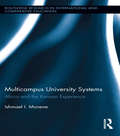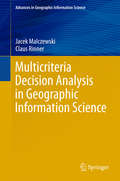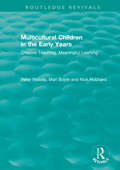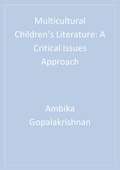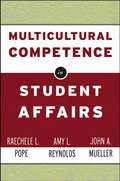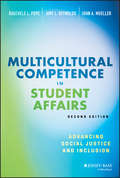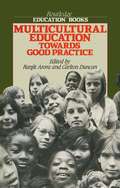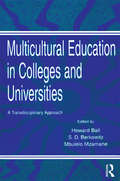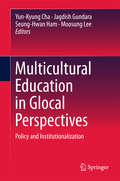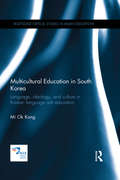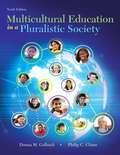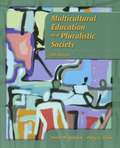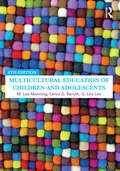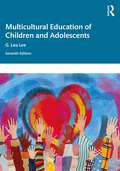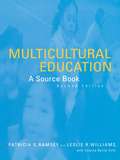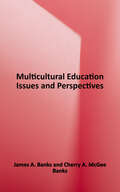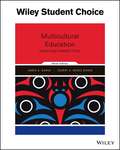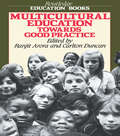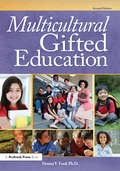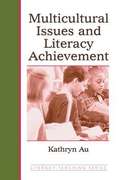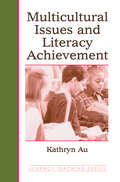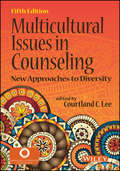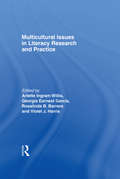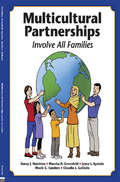- Table View
- List View
Multicampus University Systems: Africa and the Kenyan Experience (Routledge Research in International and Comparative Education)
by Ishmael I. MuneneIn the face of increasing social demand and cutbacks in state budgetary support, universities in African countries are now turning towards a multicampus system strategy. As African governments have adopted neoliberal education policies that place premium on entrepreneurialism, profit making, privatization, and markets as drivers of university development, a reshaping of the academic work and organizational framework have taken place. However, little is known about the impact of this paradigm shift on access, quality and governance in higher education. This book fills the void in research and academic knowledge about the impact of the emerging university configurations in Africa. It analyzes the paradox surrounding the performance of multicampus university systems as avenues of broadening university access but whose structural success may be qualitatively contested. This book offers a refreshing examination of the African multicampus university system from both an African and global perspective. It makes use of empirical data from Kenya collected during extensive fieldwork along with substantive library and documentary resources on the rest of the continents to fortify arguments and demonstrate important conclusions. This allows for a comparative analysis of policies and strategies used in the establishment of campuses, both within and beyond national boundaries in the continent, and will be a welcome contribution to the existing repertoire on African universities.
Multicriteria Decision Analysis in Geographic Information Science
by Jacek Malczewski Claus RinnerThis book is intended for the GIS Science and Decision Science communities. It is primarily targeted at postgraduate students and practitioners in GIS and urban, regional and environmental planning as well as applied decision analysis. It is also suitable for those studying and working with spatial decision support systems. The main objectives of this book are to effectivley integrate Multicriteria Decision Analysis (MCDA) into Geographic Information Science (GIScience), to provide a comprehensive account of theories, methods, technologies and tools for tackling spatial decision problems and to demonstrate how the GIS-MCDA approaches can be used in a wide range of planning and management situations.
Multicultural Children in the Early Years: Creative Teaching, Meaningful Learning (Routledge Revivals #Vol. 16)
by Peter Woods Mari Boyle Nick HubbardHow do multicultural children and their parents experience the very beginning of their school careers? How do teachers mediate the demands of the educational system, and how do the children adapt? What kind of access to the National Curriculum is offered to multicultural children? Originally published in 1999, the authors answer these questions by drawing on two years’ intensive research in three multi-ethnic institutions. They explore teachers’ values and beliefs and how they attempt to put them into practice. They describe how, at times, teachers were constrained to get things done because of pressures operating on them, but at other times, taught creatively in a way particularly relevant to the children’s concerns and cultures. The authors studied the children’s experiences on their transition into school, and argue that they were inducted into not only a general pupil role, but also one based on an anglicised model of pupil. Opportunities for learning which children found most meaningful came notably from free play, but these became gradually more limited as they engaged with the National Curriculum. These young children were forming complex identities as they sought to respond to the varying influences operating them. Their parents saw a cultural divide opening up between home and school. Many suggestions for practice and policy are made in the course of the book and are still relevant today.
Multicultural Children’s Literature: A Critical Issues Approach
by Ambika G. GopalakrishnanThis book is designed to prepare K-12 preservice and inservice teachers to address the social, cultural, and critical issues of our times through the use of multicultural children's books. It will be used as a core textbook in courses on multicultural children's literature and as a supplement in courses on children's literature and social studies teaching methods. It can also be used as a supplement in courses on literacy, reading, language arts, and multicultural education.
Multicultural Competence in Student Affairs
by Raechele L. Pope Amy L. Reynolds John A. Mueller Harold E. CheathamToday's leaders in higher education are focused on creating multicultural campuses. However, most higher education and student affairs professionals receive limited training for understanding the complexity of multicultural issues. If multiculturalism is to flourish on college campuses, education professionals must develop the sensitivity and awareness in affirming relevant multicultural issues and develop the skills needed to offer meaningful services to all their students. Multicultural Competence in Student Affairs is a unique resource that offers student affairs practitioners and faculty a guide that features a model of core competencies that embraces the broad scope of multicultural issues including race, class, religion, gender, sexual orientation, age, and abilities.
Multicultural Competence in Student Affairs: Advancing Social Justice and Inclusion
by Raechele L. Pope Amy L. Reynolds John A. MuellerEffectively address the challenges of equity and inclusion on campus The long-awaited second edition, Multicultural Competence in Student Affairs: Advancing Social Justice and Inclusion, introduces an updated model of student affairs competence that reflects the professional competencies identified by ACPA and NASPA (2015) and offers a valuable approach to dealing effectively with increasingly complex multicultural issues on campus. To reflect the significance of social justice, the updated model of multicultural awareness, knowledge, and skills now includes multicultural action and advocacy and speaks directly to the need for enhanced perspectives, tools, and strategies to create inclusive and equitable campuses. This book offers a fresh approach and new strategies for student affairs professionals to enhance their practice; useful guidelines and revised core competencies provide a framework for everyday challenges, best practices that advance the ability of student affairs professionals to create multicultural change on their campuses, and case studies that allow readers to consider and apply essential awareness, knowledge, skills, and action applied to common student affairs situations. Multicultural Competence in Student Affairs: Advancing Social Justice and Inclusion will allow professionals to: Examine the updated and revised dynamic model of student affairs competence Learn how multicultural competence translates into effective and efficacious practice Understand the inextricable connections between multicultural competence and social justice Examine the latest research and practical implications Explore the impacts of practices on assessment, advising, ethics, teaching, administration, technology, and more Learn tools and strategies for creating multicultural change, equity, and inclusion on campus Understanding the changes taking place on campus today and developing the competencies to make individual and systems change is essential to the role of student affairs professional. What is needed are new ways of thinking and innovative strategies and approaches to how student affairs professionals interact with students, train campus faculty and staff, and structure their campuses. Multicultural Competence in Student Affairs: Advancing Social Justice and Inclusion provides guidance for the evolving realities of higher education.
Multicultural Curriculum: New Directions for Social Theory, Practice, and Policy
by Cameron McCarthy Ram MahalingamFirst Published in 2000. Routledge is an imprint of Taylor & Francis, an informa company.
Multicultural Education Towards Good Practice
by Rahjit Arora C.G. DuncanFirst Published in 1986. With the rapidly shrinking size of our world in relation to travel, communication and business, together with the important virtues of truth, justice and equality, the demand for education to reflect positively all races of people and to make a concerted attack against stereotypes, negative and racist attitudes to some races is at last becoming commonplace. The book is in the main written for student teachers, practising teachers (probationers and experienced) and teacher trainers who will find this volume of immense use from a practical point of view.
Multicultural Education in Colleges and Universities: A Transdisciplinary Approach
by Howard Ball S. D. Berkowitz Mbulelo MzamaneThis book provides both an overview of the core dilemma in America--racism and the deadly impact it has had on American society--and an account of the ways in which the book's contributors have attempted to deal with this dilemma in their own teaching practice. Two core essays explore the theoretical and historical issues involved in defining "races" and "ethnic groups" in the West, and issues of racial and ethnic inequality in American society. The volume then examines a variety of strategies for "teaching the conflicts" in comparative literature and politics; African American literature; law, history, and political science; sociology; religion; economics; anthropology; and art and music. A premise of this book is that multicultural education in colleges and universities must be transdisciplinary--based on the perspectives offered by a multiplicity of interrelated disciplines. Clearly, scholars across the disciplines have a great deal to learn from one another about issues of race and ethnicity in American society. This book shares such knowledge in order to provide relevant, accurate information about these issues and their consequences for individuals living in America. It also encourages university educators to understand the challenges we face as a society and to be idealistic enough to want to draw upon the various strengths of our culture to assist in the remaking of American democracy.
Multicultural Education in Glocal Perspectives
by Yun-Kyung Cha Jagdish Gundara Seung-Hwan Ham Moosung LeeThis conceptually rich and empirically grounded book draws upon expertise from a panel of emerging and established international scholars to explore the institutionalization and effect of multicultural education on a global scale. Previous studies of multicultural education have largely ignored the significance of understanding the combination of multiple sociopolitical influences on multicultural education in both policy and practice. Filling this void, this book sheds light on the two main reasons for taking a "glocal" perspective on multicultural education. First, children should be provided with meaningful learning opportunities to acquire the knowledge, skills, and attitudes necessary to live in a culturally and ethno-linguistically diverse society, where the distinction between the local and the global is becoming blurred. Second, understanding both the "global grammar" and the "local semantics" of multicultural education helps researchers and policy-makers grasp the whole picture of multicultural education as an evolving social construct and phenomenon. This new book provokes a new round of discussion and research to expand and enrich our inquiry into cultural diversity and educational inclusion.
Multicultural Education in South Korea: Language, ideology, and culture in Korean language arts education (Routledge Critical Studies in Asian Education)
by Mi Ok KangThis book examines the political, ideological, and socio-cultural politics underlying the 2009 National Multicultural Curriculum Reform and recent multicultural education policies in South Korea. Unlike the conservative groups in Western countries who argue that supporting cultural diversity and the cultural rights of minority groups balkanizes ethnic differences and divides the community, the New Rights and the conservative groups in South Korea have been very supportive of multicultural discourses and practices and have created many multicultural policy agendas geared toward ushering in what have they called "the multicultural era." Through the Critical Discourse Analysis (CDA) of government multicultural policy documents, a range of media sources, the 2009 national curriculum reform policy documents, and the 200 Korean language arts textbooks from 23 textbook publishers, Multicultural Education in South Korea: Language, ideology, and culture in Korean language arts education examines how the conservative Korean government’s interpretation and practices of multiculturalism have been infiltrated and challenged by progressive and migrant-led agents/agencies. The analysis of academic, official, and popular discourses on migrant Others is focused on, but not limited to: "The multicultural era" and struggles for hegemonic power; Politics of multicultural knowledge control in education and society; Formation of discourses on multicultural society and multicultural education; Examining the national curriculum: The politics of representing migrant Others; and The hidden curriculum of multicultural education: Limitations and possibilities. The author’s insightful discussion on the politics of knowledge, education, and teaching in multicultural societies will prove particularly useful to policy makers, think-tank officials, and academic scholars in education.
Multicultural Education in a Pluralistic Society
by Philip C. Chinn Donna M. GollnickThe tenth edition of Multicultural Education in a Pluralistic Society examines issues of race, diversity and equity in society, how they are reflected in schools, and their impact on students and teachers. In order to explore these issues, the book introduces future teachers to the different cultural groups to which we and our students belong and the importance of building on the cultures and experiences of students to help them learn at high levels.
Multicultural Education in a Pluralistic Society, 6th Edition
by Philip C. Chinn Donna M. GollnickThis well-respected book helps readers understand pluralism and the complexities of cultural backgrounds and how to use this knowledge successfully in the classroom. It appropriately describes seven critical microcultures to which students and teachers belong: class; ethnicity and race; gender; exceptionality; religion; language; and age. These microcultures form the foundation for understanding pluralism and multicultural education. A focus on current issues features sections on hate groups, school violence, social justice, culturally responsible teaching, and teaching for democracy. Video insights incorporated into each chapter promote stimulating social and cultural discussions around video segments from ABC News. For teachers striving to deliver an equitable education to all students.
Multicultural Education of Children and Adolescents
by M. Lee Manning Leroy G. Baruth G. Lea LeeMulticultural Education of Children and Adolescents explores the foundations of diversity through cultural portraits of young people from a variety of backgrounds, and provides practical strategies for shaping and implementing a multicultural curriculum. In Part I, the authors introduce multicultural education as a concept and document the increasing cultural diversity of the United States. The text describes, in Part II, various cultural groups—including African, American Indian, and Hispanic cultures—to help pre-service teachers better understand the backgrounds of diverse learners. Part III focuses on topics that educators should consider when planning and implementing programs that teach acceptance and respect for cultural diversity. Through this series of applied chapters, teacher candidates will learn to use the most effective instructional practices with diverse learners, and to work successfully with families, school personnel, and administrators to implement a multicultural program. Content and features new to the sixth edition include the following: Every chapter opens with a real-life story that introduces the subject matter by showing the ideas in action. Points to Ponder boxes urge readers to reflect more deeply on information they have just read. Additional Case Studies with accompanying Questions for Discussion in all chapters enable nuanced consideration of the crucial differences between culturally specific learning styles. Increased emphasis on Social Justice and White Privilege, including its effects on all people. Chapter 13 has been significantly revised to include increased and updated information on sexual orientation, including transgender students. Chapters in Part II now feature further expanded sections on socioeconomic status and conditions of each ethnic group.
Multicultural Education of Children and Adolescents
by G. Lea LeeMulticultural Education of Children and Adolescents explores the foundations of diversity through cultural portraits of young people from a variety of backgrounds, and provides practical strategies for shaping and implementing a multicultural curriculum.Content and features new to the seventh edition include the following: Every chapter opens with a real-life story that introduces the subject matter by showing the ideas in action Points to Ponder boxes urge readers to reflect more deeply on information they have just read Case Studies with accompanying Questions for Discussion in all chapters enable nuanced consideration of the crucial differences between culturally specific learning styles Chapter 13 now includes a section on teaching and understanding LGBTQIA+ youth, with updated teacher resources to support learning The book addresses newly emerging issues in multicultural education throughout, including discussions around Critical Race Theory, culturally relevant pedagogy (CRP), the impact of the #BlackLivesMatter movement, the impact of xenophobia and hate towards Asian communities during the COVID-19 pandemic, as well as migration and refugee issues Through a series of applied chapters, teacher candidates will learn to use the most effective instructional practices with diverse learners, and to work successfully with families, school personnel, and administrators to implement a multicultural program.
Multicultural Education: A Source Book, Second Edition (RoutledgeFalmer Readers in Education)
by Patricia Ramsey Leslie R. Williams Edwina VoldThe second edition of this source book contains essays and annotations on a number of issues related to multicultural education. The authors define multicultural education as a process-oriented creation of learning experiences that foster an awareness of, respect for, and enjoyment of the diversity of our society and world. Inherent in this definition of multicultural education is a commitment to create a more just and equitable society for all people. This book, then, offers suggestions relevant to the teaching of all children, all teaching and curricular decisions, and every aspect of educational policy.
Multicultural Education: Issues and Perspectives
by James A. Banks Cherry A. McGee BanksAs diversity continues to increase in the United States, ethnic, cultural, social-class, and linguistic gaps are widening between teachers and their students. The rapidly changing educational landscape presents unique challenges and opportunities for addressing diversity both creatively and constructively in schools. Multicultural Education helps current and future educators fully understand sophisticated concepts of culture; become more effective practitioners in diverse classrooms; and view race, class, gender, social class, and exceptionality as intersectional concepts. Now in its tenth edition, this bestselling textbook assists educators in effectively responding to the ways race, social class, and gender interact to influence student behavior and learning. Contributions from leading authorities in multicultural education discuss the effects of class and religion on education; differences in educational opportunities for male, female, and LGBTQ students; and issues surrounding non-native English speakers, students of color, and students with disabilities. Contemporary in relevance, this timely volume promotes multicultural education as a process of school reform. Practical advice helps teachers increase student academic achievement, work effectively with parents, improve classroom assessment, and benefit from diversity.
Multicultural Education: Issues and Perspectives
by James A. Banks; Cherry A. McGee BanksThere is a wide and growing ethnic, cultural, social-class, and linguistic gap between many of the nations teachers and their students. Multicultural Education: Issues and Perspectives, 9th edition, is designed to help current and future educators acquire the concepts, paradigms, and explanations needed to become effective practitioners in culturally, racially, linguistically, and social-class diverse classrooms and schools. An important goal of the 9th edition is to help educators attain a sophisticated understanding of the concept of culture and to view race, class, gender, social class, and exceptionality as interacting concepts rather than as separate and distinct.
Multicultural Education: Towards Good Practice
by Ranjit Arora Carlton DuncanFirst published in 1987. Multicultural Education is designed to emphasise models of good practice tried and tested by teachers in multicultural schools throughout Britain. It describes both the issues of multicultural education and the practical approaches for teachers working in the classroom. The contributors, all experienced in the field, illustrate the ways in which teachers are responding positively to the changing educational needs of multicultural, multiracial and multilingual schools in Britain. The emphasis throughout is on 'starting where the pupils are' and building on what they bring to the classroom.
Multicultural Gifted Education
by Donna Y. FordEach year, the United States witnesses significant changes in the demographics of its citizens. Accordingly, schools—and the students we teach—are also changing. With such changes come the need, responsibility, and obligation for educators to provide students with an education that is both rigorous and culturally responsive. This book bridges the gap that exists between educating advanced learners and educating culturally different learners. Multicultural Gifted Education, 2nd ed. addresses various topics, including racially and culturally diverse students and families, historical and legal perspectives on educating gifted and minority students, culturally responsive curriculum and assessment, and counseling students from a multicultural perspective.
Multicultural Issues and Literacy Achievement
by Kathryn H. AuThis book is a sequel to the author's earlier volume entitled, Literacy Instruction in Multicultural Settings. In addition to extensive updating of earlier material, this book extends the content coverage to include issues of power, attitudes, and systemic change through the application of discourse theory and critical theory. In doing so, however, the author has tried to maintain the brevity, stylistic clarity, and classroom focus of the earlier volume. Key features of this important new book include: *Teaching Flexibility. Although written with the classroom needs of pre-service teachers in mind, theory and research are treated in sufficient depth to make the book suitable for graduate courses and for teacher study groups. *Issues Organization. Each chapter is organized around familiar issues that characterize schools and classrooms with diverse student populations and explores these issues through new lenses that most teachers have not previously encountered. *Social Constructivist Perspective. Critical theory, discourse theory, and historical perspective are introduced in order to sensitize readers to the need to recognize negative, socially sustained patterns that hamper literacy achievement and replace them with positive patterns. To this end each chapter asks students to maintain a running list of negative patterns along with alternative positive patterns.
Multicultural Issues and Literacy Achievement (Literacy Teaching Series)
by Kathryn AuThis book is a sequel to the author's earlier volume entitled, Literacy Instruction in Multicultural Settings. In addition to extensive updating of earlier material, this book extends the content coverage to include issues of power, attitudes, and systemic change through the application of discourse theory and critical theory. In doing so, however, the author has tried to maintain the brevity, stylistic clarity, and classroom focus of the earlier volume.Key features of this important new book include:*Teaching Flexibility. Although written with the classroom needs of pre-service teachers in mind, theory and research are treated in sufficient depth to make the book suitable for graduate courses and for teacher study groups.*Issues Organization. Each chapter is organized around familiar issues that characterize schools and classrooms with diverse student populations and explores these issues through new lenses that most teachers have not previously encountered.*Social Constructivist Perspective. Critical theory, discourse theory, and historical perspective are introduced in order to sensitize readers to the need to recognize negative, socially sustained patterns that hamper literacy achievement and replace them with positive patterns. To this end each chapter asks students to maintain a running list of negative patterns along with alternative positive patterns.
Multicultural Issues in Counseling: New Approaches to Diversity
by Courtland C. LeeWith an emphasis on direct application to practice, this graduate-level text offers strategies for working with diverse client groups in a variety of settings. Introductory chapters build a foundation for cross-cultural counseling with discussions on current theory, the ongoing pursuit of multicultural competence, and the complexities of intersecting identities. Next, 15 chapters designed to help counselors develop their knowledge about and skills with the following populations are presented: African Americans American Indians Arab Americans Asian and Pacific Islanders Economically disadvantaged clients Immigrants Latinx LGBTQ clients Men Military personnel Multiracial individuals Older adults People with disabilities White people of European descent Women Detailed case studies in this section illustrate real-world perspectives on assessment and treatment for an increased understanding of culturally responsive counseling. The final section of the book focuses on ethics and social justice issues. *Requests for digital versions from the ACA can be found on wiley.com. *To request print copies, please visit the ACA website here. *Reproduction requests for material from books published by ACA should be directed to permissions@counseling.org
Multicultural Issues in Literacy Research and Practice
by Rosalinda B. Barrera Arlette Ingram Willis Georgia Earnest García Violet J. HarrisThis volume brings together researchers and participants from diverse groups, reflecting the different ways in which the field of multicultural literacies has been interpreted. A common theme across the chapters is attention to the ways in which elements of difference--race, ethnicity, gender, class, and language--create dynamic tensions that influence students' literacy experiences and achievement. The hope of the editors is that readers will build on the experiences and findings presented so that the field of multicultural literacies will have a greater impact of literacy research, policy, and practice.
Multicultural Partnerships: Involve All Families
by Joyce L. Epstein Mavis G. Sanders Darcy J. Hutchins Marsha D. Greenfeld Claudia GalindoThis is a must-have, research-based guide for all schools serving culturally diverse elementary and middle grade students and their communities. It's filled with fun, practical, highly effective strategies for raising awareness and engaging all families in their children's education — a sure path toward increased student success! Get detailed examples and step-by-step guidelines for implementing successful... Multicultural Family Nights Workshops for Parents Curriculum Connections Much of the reproducible material is also provided in Spanish - giving educators an even broader reach!
